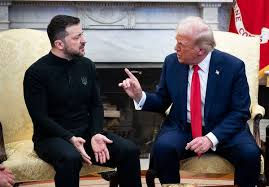The Inflection Point
- Jack Goldstein
- 26 mar
- 2 Min. de lectura
Faced with the decision whether to support Washington's new policy toward Ukraine, Israel must choose between our identity and our security.

By Michael Oren
For the first time last week, before President Trump’s televised altercation with President Zelensky in the White House, the United States sided with Russia in opposing a UN resolution condemning Moscow for its invasion of Ukraine. And for the first time on such a resolution, Israel also voted “no.”
The event, which further deepened the West’s division between America’s pro-Russian and Europe’s pro-Ukrainian camps, forced Israel to choose between its U.S. and Western European allies. Israel’s decision to side with the former will have profound implications for our foreign policy, our security, and the very nature of our state.
Full disclosure: Since the beginning of the Russian invasion three years ago, I have been an outspoken supporter of Ukraine. I opposed our government’s policy of neutrality on both strategic and moral grounds.
I did not fear, as did many Israelis back then, that backing Ukraine would result in Russian troops firing on our planes attacking Iranian targets in Syria. Russia, I argued, didn’t want the Iranians in Syria any more than we did and was happy to let the IDF do the dirty work. Our interest lay rather in siding with the West, whose military and diplomatic support we would need in a future war, and with Ukraine, a fellow democracy whose territorial integrity had been grossly violated by a totalitarian state. I was happy when Israel finally gave Ukraine helmets and other defensive equipment as well as medical aid.
Much has happened since then. In the war that began on October 7, Russia sided fully with our enemies, providing them not only with unconditional diplomatic support but with some of the world’s most advanced conventional weapons. Much of the West, meanwhile, fiercely criticized Israel’s conduct of the war and even accused us of committing war crimes. Throughout, Israel’s dependence on the United States radically deepened.
It is no exaggeration to say that President Trump can now determine the future of Israel’s security, supplying us with arms and unreservedly upholding our right to self-defense, even against Iran. For this support we must be profoundly grateful. But we must also realize that it comes with a price. We, too, must support America.
That reality has presented us with a profound dilemma: remain committed to Europe’s alliance with Ukraine or align with the pro-Putin policy of Trump. We must choose between our identity as a Western-style Jewish and Democratic state and our reality as a small state fighting for its survival among savage enemies. Either decision carries serious long-term strategic and moral consequences.
It may be the first of many such dilemmas we are likely to face. I fully understand the government’s decision. The safety of our state and of our citizens must come first. But understanding that doesn’t mean we must welcome the move or fail to consider its ramifications.
Last week’s vote marked a heavy day for Israel and perhaps a fateful turning point both in the way we look at the world and the way we look at ourselves.





Comments